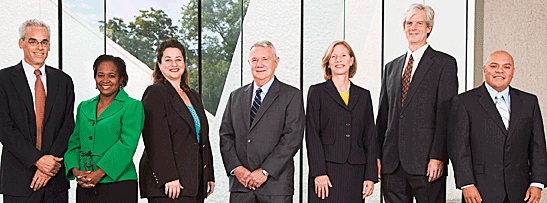City Council
Court halts $354 million development subsidy
Austin City Manager: Dallas discard vs Austin retread
They’re off and running for council
2009 Austin City Council E-mails
Private Deliberations and Political Maneuvering
More than 2,400 Pages of 2009 E-mails
Published Here in a Searchable Format
© The Austin Bulldog 2011


 The schisms within the Austin City Council that surfaced during the runoff election between incumbent Council Member Randi Shade and challenger Kathie Tovo were a revelation, as the other incumbents split evenly in lining up to support Shade or Tovo.
The schisms within the Austin City Council that surfaced during the runoff election between incumbent Council Member Randi Shade and challenger Kathie Tovo were a revelation, as the other incumbents split evenly in lining up to support Shade or Tovo.
Such passionate and public election advocacy among sitting council members is rare, if not unprecedented. The election outcome created deep political wounds in need of healing, not only for personal relations among council members but also for making good public policy when the council’s summer hiatus is over in three weeks.
The thousands of e-mails written in 2010 and January 2011 obtained through open records requests and The Austin Bulldog’s lawsuit, published May 12, foreshadowed some of the differences that surfaced in this runoff election. But the e-mails exchanged by council members in 2009, published here, show the roots of dissent among council members goes back much further.
The latest batch of more than 2,400 e-mails obtained through an open records request raise new issues—not only for what these e-mails reveal, but also because of what was withheld.
Some of these records show council members communicated among themselves about city business in numbers equaling or exceeding a quorum, a possible violation of the Texas Open Meetings Act.
Some of the council members also deliberated through their private e-mail accounts about a $250 million city project that was under consideration.
As for what was withheld, two (not four, as first reported) council members failed to provide copies of e-mails about city business conducted on their personal e-mail accounts during calendar year 2009: Sheryl Cole and Mike Martinez. (Deleted Chris Riley and Randi Shade.)
To withhold private e-mails about city business flies in the face of at least four open records opinions issued by the Texas Attorney General, which state that e-mails about government business that were created or received on personal accounts are public records (OR2003-0951, OR2003-1890, OR2005-01126, OR2005-06753) and thus are subject to release under the Texas Public Information Act.
As reported March 2, The Austin Bulldog filed a lawsuit against the mayor, council members, and City of Austin because of the failure to release copies of personal e-mails about city business exchanged by the city council during calendar year 2010 and January 2011. As a result, the mayor and council members eventually relented and released at least some of those e-mails.
For e-mails sent or received in 2009, Mayor Lee Leffingwell and Council Members Laura Morrison, Chris Riley, and Randi Shade released personal e-mails about city business and Council Member Bill Spelman released city business e-mails from his University of Texas account. As in the earlier releases forced by the lawsuit, the city characterized these actions as being voluntary. (Update July 7, 2011: Click here to see the cover letter provided by the City of Austin that accompanied the 2009 e-mails released by the city.)
The bottom line is the other city council members continue to take the position that they need not turn over e-mails about city business conducted on personal accounts. This position is inconsistent with the e-mail policy the city council adopted in an April 7 resolution that applies going forward. (See The Austin Bulldog report of April 15.)
Open Government Fixes Costing Big Bucks
So Far and No End in Sight
The Austin City Council so far has authorized spending $399,000 to hire outside attorneys to provide advice to bring the city into compliance with the Texas Open Meetings Act and to defend a lawsuit filed by The Austin Bulldog under the Texas Public Information Act.
More than half that amount has been spent already, most of it to deal with the ongoing investigation of possible criminal violations of the Texas Open Meetings Act by Travis County District Attorney David Escamilla.
Section 551.143 of the Texas Open Meetings Act states that a member or group of members of a governmental body commits an offense if the member or group of members knowingly conspire to circumvent this chapter by meeting in numbers less than a quorum for the purpose of secret deliberations in violation of this chapter. An offense, if proven, is punishable by a fine of $100 to $500 and confinement in the county jail for one to six months, or both the fine and confinement.
 The Austin City Council’s possible violations of Section 551.143 were exposed by The Austin Bulldog’s investigative report published January 25. That same day The Austin Bulldog reported that Escamilla was investigating these matters. That investigation is still ongoing.
The Austin City Council’s possible violations of Section 551.143 were exposed by The Austin Bulldog’s investigative report published January 25. That same day The Austin Bulldog reported that Escamilla was investigating these matters. That investigation is still ongoing.
The city’s response to these reports was swift. On January 28, the city council hired three law firms and huddled with their lawyers for two and a half hours in a closed-door executive session.
The practice of scheduled private meetings was immediately stopped. The Austin City Council held its first public work session February 9.
The investigative report exposed the longstanding practice of the mayor and council members holding a flurry of routinely scheduled private meetings that for many years had been taking place a day or two before every council meeting. These private meetings denied public access to significant deliberations about city business that are required to be conducted in the sunshine of open meetings.
The Austin Bulldog reported February 7 that the City of Austin committed $159,000 to engage three law firms to provide legal advice related to Texas Open Meetings Act: James E. “Jim” Cousar of Thompson & Knight LLP, C. Robert “Bob” Heath of Bickerstaff Heath Delgado Acosta LLP, and Randy T. Leavitt of the Law Office of Randy T. Leavitt.
Since then, City Attorney Karen Kennard has issued amendments that allowed other lawyers and support personnel within the three law firms to assist, and increased the total authorized expenditures to $289,000 solely to address Texas Open Meetings Act issues.
Sworn Financial Statements
Updated Friday, June 3, 2011, 2:30pm
May Have Violated Austin City Code
Sworn Financial Statements Give Public
Tools to Monitor Their Elected Officials
Investigative Report by Ken Martin
© The Austin Bulldog 2011
City Council Members Chris Riley and Randi Shade may have violated the Austin City Code by not reporting the financial activity of their domestic partners.
Many financial statements filed by the mayor and other council members are incomplete or erroneous, and one annual statement is missing.
Perhaps a larger problem is that neither these elected officials (with some exceptions) nor the city staff is paying sufficient attention to ensure that these important statements are accurately prepared to fully comply with state law and the City Code. The penalties that apply to the more serious violations are not being enforced. And citizens are kept in the dark because few are aware these documents exist or where to find them.
These problems were discovered during The Austin Bulldog’s broader investigation aimed at bringing greater transparency to city government by giving citizens the tools to monitor the conduct of their elected officials.
Do Austin’s mayor and council members have conflicts of interest in the decisions they make? How would you ever know?
Aside from the fact that these officials are required to withdraw from even discussing something in which they have a substantial interest, the public is entitled to be informed of their financial interests so they can observe and monitor how these officials conduct themselves.
System lacks transparency
Searchable Mayor and Council E-mails
Made Available in Searchable Format
E-mails, Text Messages, Meeting Notes
Obtained Through Open Records, Lawsuit
by Ken Martin
© The Austin Bulldog 2011
While many e-mails exchanged by the Austin mayor and city council members have been made public previously, as they were released in large batches by the city or dribbled out in small quantities by individual council members, The Austin Bulldog continues to get requests for these files to be made available in a searchable format.
To that end, this report consolidates all records previously made public, adds hundreds of new records, and presents them in searchable files.
All told, The Austin Bulldog obtained more than 4,800 pages of public records through a series of requests filed under the Texas Public Information Act and a lawsuit against the mayor, council members and City of Austin.
More than 600 pages of these records—in the lingo used by the City of Austin—came out of computer folders titled “deleted” or in “dumpsters” that were not searched initially in response to our open records requests. Salvaging these records is important because otherwise they could have been permanently removed at the touch of a button, in possible violation of state law and city regulations governing records retention.
More than 500 pages of these never before published records were obtained from City Manager Marc Ott, including a volume of notes in his own, fairly legible handwriting that reflect the topics discussed with the mayor and council members during private one-on-one meetings.
The Austin Bulldog's lawsuit triggered the release of about 1,500 pages of these e-mails. These include:
• E-mails about city business that were sent or received using the mayor and council members private e-mail accounts (almost 300 pages).
• E-mails about city business that Council Member Bill Spelman sent on his University of Texas account (200 pages).
• E-mails located by the city's Communications and Technology Management (CTM) office through additional searches for responsive records (1,000 pages).
Proposed City Charter Amendments
to Create Geographic Representation
and Other Charter Changes in Council Resolution
by Ken Martin
© The Austin Bulldog 2011
Geographic representation for the citizens of Austin is being driven from the top down and the bottom up. The Austin City Council is squeezed in the middle and trotting out its own proposal at today’s council meeting.
The pressure from the top comes from bills pending in the Texas Legislature that would force the city to form at least six single-member districts for the May 2012 election, when the mayor and three council members will be up for reelection.
The bottom-up pressure comes from the possible petition drive that if successful could result in a citizen-driven plan for geographic representation of council members to be put on the ballot this November or the following May.
Barring interference from the legislation or an earlier election forced by a successful petition drive, the city’s proposal is geared to be on the ballot in November 2012.
The Austin City Council is scheduled to vote today on a resolution that would direct the city manager to prepare draft City Charter amendments to accomplish a range of reforms. Among these are adding geographic representation to the council, consisting of six members elected from districts, with the mayor and two members elected at-large.
The resolution further directs: moving municipal elections from May to be held in November of odd-numbered years; increasing the term of office from three years to four years; and eliminating staggered terms, so that all council members would be elected once every four years (except for special elections for unexpired terms).
Charter changes for geographic representation on the council have been on the ballot six times and failed six times.
Broad support for council districts
Newsletter
Keep up with the best investigative reporting in Austin.
© The Austin Bulldog. All rights reserved.
2028 E. Ben White Blvd. #240-6115 Austin TX 78741







